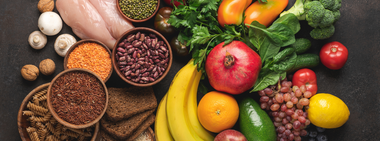Using Food to Boost Immunity - for Coronavirus and Beyond

Editor's note: Step One Foods was founded by Cardiologist Elizabeth Klodas to create a healthy, convenient and delicious daily food product that can improve your health. You can read about our clinically proven results in lowering cholesterol, or shop our products to try them yourself. If you’re not satisfied, we’ll give you your money back.
This week, Dr. Klodas hosted a Facebook Live conversation about diet and immunity. Below is the recording of the conversation, as well as further details on the science behind food as medicine.
The immune system is complex and comprised of many components:
- Barriers to entry that help stop bacteria and viruses from entering our bodies in the first place. Think skin, mucous membranes, and the gut microbiome.
- General defense responders that engulf foreign invaders when they do manage to get through the barriers. Think white blood cells like neutrophils and macrophages.
- Targeted defense responders that destroy cells infected by the viruses and bacteria that got past the general defense layer. Think antibodies and killer cells.
The immune system can be supported to function at its best -- and at every level. For example, handwashing and social distancing help our skin and mucous membranes minimize contact with potential pathogens. While probiotics and prebiotics (like you’ll find in yogurt and fiber-rich whole grains respectively) help keep our microbiome healthy and resilient.
Several vitamins and nutrients are vital to optimizing immune system response but are typically under-consumed by most Americans. These include vitamins A, C, D and E and omega 3 fatty acids. Although these can be obtained through supplements, the data is clear and consistent that, with the exception of vitamin D, getting them from whole food sources is far more effective and impactful.
Here are the recommended daily amounts (RDA) needed for these vitamins and how to attain them from food:
- Vitamin A – 900 ug/day (slightly less for women). This can be supplied by half a cup of baked sweet potato or just a cup of raw carrots.
- Vitamin C – 90 mg/day (again slightly less for women). Although we traditionally think about citrus fruit for vitamin C, you can get this amount from 1 kiwifruit or a cup of strawberries. 1 medium sweet red pepper gets you 150 mg! By comparison, one orange provides 70 mg. Although there is no data to support high Vitamin C intake for preventing or modifying a COVID-19 infection, given that some data does exist that higher doses of Vitamin C can help with the common cold (which is also circulating), it might be reasonable to aim for 200 mg of Vitamin C at present.
- Vitamin D – 800 IU/day is the minimum recommended amount. This is very difficult to obtain from food (vitamin D is known as the sunshine vitamin for good reason) but better sources include pink salmon (3 oz provides 370 IU) and sardines (3 oz provides 160 IU). 10 to 30 minutes of midday sun exposure several times per week (without sunscreen as sunscreen blocks vitamin D production) should be adequate to get the amount you need.
- Vitamin E – 15 mg/day. One ounce of almonds gets you 7 mg and a whole avocado gets you 3 mg.
- Omega 3 – No RDA in place other than we are all advised to consume 2 servings of oily fish per week. Salmon and sardines are great choices here because they’re also better sources of vitamin D. 3 oz of either will supply around 1.2 grams of EPA/DHA omega 3s. Nuts and seeds – especially walnuts, flax and chia - are also good sources and supply the essential form of omega 3s, namely ALA.
Finally – don’t forget the basics. Social isolation, emotional distress and lack of exercise are all immune system stressors. In fact, if you think about it, what supports a healthy immune system supports healthy longevity - and it’s what I’ve been preaching all along! Regular physical activity, social interconnectedness, an inner sense of purpose and joy, and a whole-food, plant-based diet not only help you achieve disease-free aging, they’re also anti-inflammatory at their core.
So get outside in the sunshine and get some vitamin D. Eat nuts and seeds, and fruits and vegetables so you’re getting plenty of the nutrients typically missing in our diets. Add some yogurt and whole grains so you’re feeding your microbiome. Connect with friends and loved ones by phone, email, social media and snail mail. A kind message right now can mean so much to someone who might be alone. And try to limit your updates on Coronavirus to a couple hours per day, focusing instead on finding something to be grateful for. We will all get through this - by taking good care of ourselves and of each other.

Tested & Proven Results.
- Cardiologist formulated
- Supported by over 500 publications
- Clinically-proven, in a double-blind randomized trial with Mayo Clinic and The University of Manitoba
80% of participants lowered their cholesterol in just 30 days. With just two servings per day, Step One Foods offers a proven-effective way to naturally lower LDL (bad) cholesterol.
Get heart health tips and articles like this, delivered right to your email.
New articles every week.
You may also like...

Insulin Resistance, Prediabetes and Type 2 Diabetes. Part 4: Un-Doing It.

You don’t need to avoid foods with cholesterol…except for these



